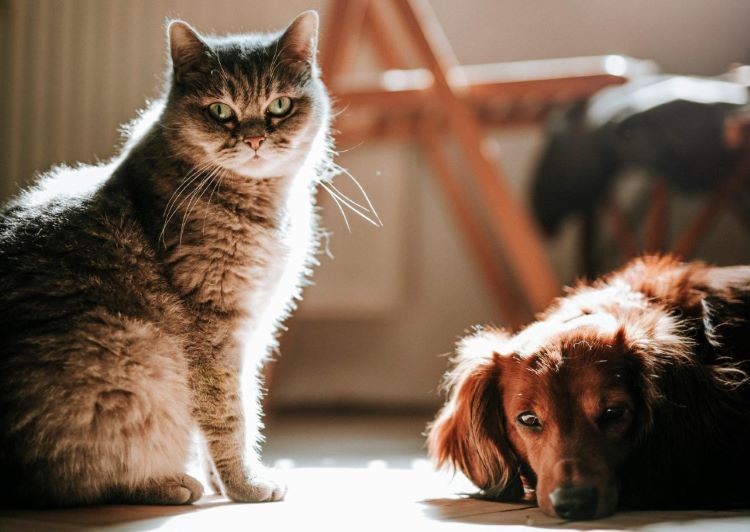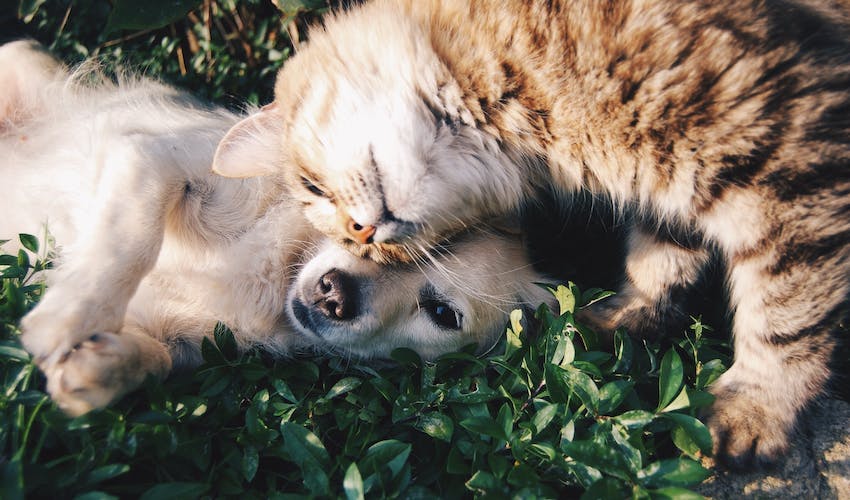Ready to help treat your pet to a healthy life?
Are Cats Smarter Than Dogs? Debunking Myths
By : Sam Chambers | Published Jul 9, 2024

When it comes to their four-legged family members, cat and dog parents sometimes fight like, well — cats and dogs. This playful rivalry has stood the test of time, along with the never-ending debate: are cats smarter than dogs, or are dogs smarter than cats?
Dog lovers say dogs are smarter because they’re obedient and trainable, while cat lovers believe cats are the more intelligent species because they’re independent thinkers. Both sides make good points, and while it’s a fun question to puzzle over, this ongoing debate can actually help us live more harmoniously with our furry companions.
Understanding pet intelligence has practical benefits for pet owners, from improving communication to solving behavioral issues. No matter which side of the fence you fall, we dug into the evidence to try to solve this mystery once and for all.
Are cats or dogs smarter?
It goes without saying that both cats and dogs are smart in their own ways. Not to mention, pets come in all shapes, sizes, and levels of brainpower. As such, understanding the differences between canine and feline intelligence has perplexed researchers for decades. Even comparing dog IQ to cat IQ isn’t as straightforward as you may think.
So, what does it really mean to be smart? Animal intelligence is usually divided into three categories:
- Cognitive intelligence: problem-solving, memory, critical thinking, mental focus, and decision-making.
- Emotional & social intelligence: managing and expressing emotions, relating to others, and communicating socially.
- Practical intelligence: the ability to adapt, survive, and thrive in the world.
“Asking which species is smarter is like asking if a hammer is a better tool than a screwdriver,” says Brian Hare, founder and director of Duke University’s Canine Cognition Center. In other words, dogs and cats are smart in their respective areas. Dogs excel at learning from humans and adapting their behavior, whereas cats demonstrate remarkable memory and problem-solving skills.
Why does it matter who’s smarter?
Understanding feline and canine intelligence goes beyond settling a silly debate — it also provides practical benefits for pet owners. Intelligence influences how we train, bond, and interact with our pets.
- Training — Recognizing your pet’s intelligence allows you to tailor your training to match their cognitive abilities, ensuring a more effective and enjoyable experience for both of you.
- Bonding — When you understand how your pet’s brain works, you can engage with them more meaningfully and in ways that stimulate their mind more effectively.
- Behavior modification — If your pet has behavioral issues, you can tailor your approach based on their level of intelligence. High-energy dogs that were bred to work, for example, are highly intelligent. They can get bored easily and typically require more training, attention, and exercise.
- Communication — Dogs and cats have unique cognitive strengths and weaknesses, which influences how they communicate with humans. By understanding how to interpret their subtle behaviors and cues, you can respond more effectively to their needs.
- Quality of life — Pets have different needs based on their intelligence levels, and recognizing these differences can help you provide a better quality of life for your pet. This understanding ultimately helps foster greater empathy and respect towards your pet, which is something every pet owner should strive for.

How are cats smarter than dogs?
The main arguments against cats being smarter than dogs stem from their aloofness and disinterest in humans. Cats are certainly less eager to please, but cats were never domesticated in the same way dogs were. The first domestication of cats happened nearly 10,000 years ago, when farmers began bonding with cats who helped control rodent populations.
But just because cats are more difficult to train, doesn’t mean they’re not intelligent. In fact, there’s evidence that cats are smarter in specific areas.
Problem-solving
A study at Eötvös Loránd University in Budapest, Hungary, showed that cats are superior problem-solvers. Cats will keep trying to solve a puzzle long after a dog has given up, and they're often quicker at finding solutions — like figuring out how to open doors or kitchen cabinets. Thanks to their natural curiosity, cats are more determined when it comes to finding solutions to their problems.
Memory
One study showed that cats could remember where a bowl of food had been hidden for up to 16 hours, while dogs could only remember for about 5 minutes. Cats are certainly more capable of using their short-term memory, but only if the information is useful or important to them. This may explain why the average dog can learn 165 words, while the average cat can only understand about 40 words. True to their stereotype, cats are picky about what they remember.
Besides having better short-term memory, cats also have a more developed hippocampus. It’s the part of the brain that handles spatial memory, which helps them navigate the world and remember where things are — like the location of their food bowl. It’s why cats are such good hunters and less likely to get lost.
Practical intelligence
As natural-born hunters and explorers, cats embody greater practical intelligence, enabling them to survive in the wild. Cats can live on their own without humans, as opposed to dogs who tend to be more co-dependent and reliant.
In addition, it’s well known that cats are independent creatures. Their reluctance to accept food offered by hand, for example, is likely a survival skill that helps keep them safe. Dogs, meanwhile, are more trusting when it comes to humans.
Social intelligence
Despite their reputation for being aloof, cats have a high degree of social intelligence — often at the same level as dogs. One study showed that when a person pays attention to a cat, they’ll respond by spending more time with that person. This suggests that cats appreciate and reciprocate human attention. Cats have even been found to prefer human interactions over food and toys.
When comparing social intelligence between dogs and cats, keep in mind that dogs and cats are treated differently. Dogs often receive more socialization compared to cats, who typically don’t receive the same levels of socialization and training.
Despite their differences, evidence suggests that dogs and cats can, in fact, get along. With a proper introduction, you can foster a harmonious relationship between a dog and a cat.
How are dogs smarter than cats?
Cat lovers argue that dogs are less intelligent due to their blind loyalty and obedience. For instance, many dogs lack a sense of “stranger danger,” which isn’t the smartest survival strategy. Cats are also independent thinkers, whereas dogs are less self-sufficient and need someone to hold their paw.
Dogs might not have the best survival skills, but they were specifically bred to follow commands and please humans. As such, dogs are smarter in their own ways.
Cognitive skills
A neuroscientist who studies animal intelligence found that dogs have twice as many neurons as cats — almost 300 million more, in fact. Neurons are responsible for processing and sending information through the brain. Generally, the more neurons you have, the better your mental and cognitive skills are.
Similarly, brain size can also be used to measure cognitive functioning. For the most part, a bigger brain means more brainpower. Dogs not only have larger brains than cats, but also a larger cerebral cortex. This area of the brain is responsible for many essential functions like memory, reasoning, problem-solving, learning, and emotions.
Another study showed that the bigger the brain, the more self-control an animal has. The ability to practice self-control highlights the strong cognitive skills dogs have.
Emotional intelligence
Cats are capable of reading human emotions, but dogs are better at sensing and understanding our moods. As any dog owner can attest, dogs always seem to know what we need, when we need it. Research has shown that dogs can tell when we’re happy, sad, afraid, and angry based on our facial expressions, voice, and body language. This speaks to their high degree of empathy and emotional intelligence.
Social intelligence
Studies show that dogs have better language skills than cats, as they can learn and understand more words. Their ability to understand and communicate with humans speaks to their high level of social intelligence. Compared to humans, their social skills are similar to a two-year-old child.
Additionally, their pack mentality is partly responsible for why dogs are such social animals. They love being part of a group and want to please their humans, which is why they’re such loyal companions.
Trainability
During domestication, dogs were bred to perform specific tasks for humans, such as hunting and herding livestock. Today, dogs continue to learn complex tasks, such as guiding individuals with disabilities, alerting diabetics when they need to take insulin, tracking down missing persons, and more!
Breed plays a huge role in trainability. The Border Collie, for example, is highly trainable due to how smart and how fast they learn. One Border Collie even became known as “the smartest dog in the world” after learning more than 1,000 words.
Likewise, breed also plays a role in how well dogs and cats get along. For example, calmer dogs usually cohabitate more peacefully with cats than those with a strong prey drive.

The verdict
In the end, comparing the intelligence of dogs and cats is a lot like comparing tennis balls and frisbees. So, until researchers can definitively decide who’s smarter, let’s cherish and celebrate the things that make our pets so unique.
Whether you’re a cat or dog lover, they’re both smart in their own ways. However, they also have their less smart moments, like eating things they shouldn’t and getting into trouble. To prioritize their health and well-being, consider protecting them with pet insurance.
